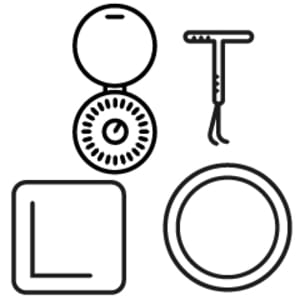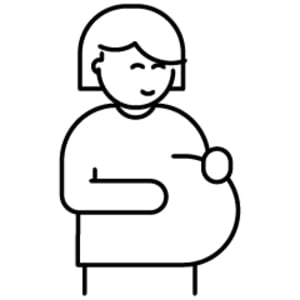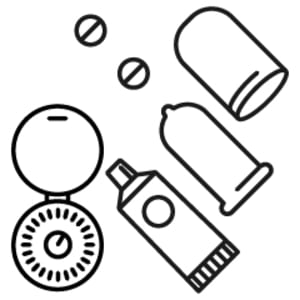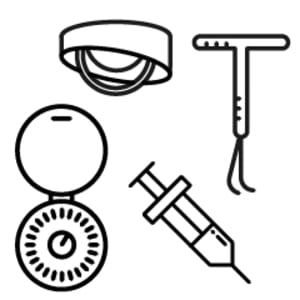Birth Control for Teens
Make an Appointment
Our team is here to help you make an appointment with the specialists that you need.
Birth Control for Teens
Overview
Birth control is any method used to prevent pregnancy. If you have vaginal sex without birth control, you could get pregnant. The only sure way to not get pregnant is to not have vaginal sex. But finding birth control that works for you can help avoid an unplanned pregnancy.
Your Choices
There are many kinds of birth control. Each has pros and cons. Find what works for you.

Long-acting reversible contraception (LARC). These are placed inside your body by a doctor. They can prevent pregnancy for years.
Examples include:
- An implant (hormonal).
- Copper intrauterine device (IUD).
- Hormonal IUDs.

Short-acting hormonal methods. These release hormones (estrogen and progestin, or progestin only).
Examples include:
- Combination birth control pills ("the pill").
- Skin patches.
- A vaginal ring.
- A shot.
- Mini-pills.

Barrier methods. Use these every time you have vaginal sex.
Examples include:
- External (male) condoms.
- Internal (female) condoms.
- Diaphragms.
- Cervical caps.
- Sponges.

Spermicides. These kill sperm or stop sperm from moving. They can be a gel, cream, foam, film, or tablet. Use them before vaginal sex.
Examples include:
- Nonoxynol-9.
- pH regulator gel.

Fertility awareness. You'll learn when you're most likely to become pregnant (fertile). You can avoid vaginal sex at that time.
It's also called:
- Natural family planning.
- The rhythm method.

Permanent birth control (sterilization). This can be an option if you're sure that you don't want to get pregnant later.
This includes:
- Vasectomy.
- Having tubes tied (tubal ligation).

Emergency contraception. This is a backup method. Use it if you didn't use birth control or your birth control method failed.
Examples include:
- Copper and hormonal IUDs.
- Emergency contraceptive pills.
Emergency contraception
Emergency contraception is used to prevent pregnancy after unprotected vaginal sex. For example, you can use it if you were sexually assaulted (raped). You can also use it if a condom breaks or if you think your birth control didn't work.
If you had unprotected vaginal sex, you could get pregnant. This is true even if you haven't started your periods yet or you're close to menopause.
If you use emergency contraception right away, it might prevent an unplanned pregnancy. It may also keep you from worrying while you wait for your next period.
One option is emergency contraception ("morning-after") pills. These pills don't work as well as regular types of birth control. If it's important to you to prevent pregnancy, talk to your doctor about a type of regular birth control that will work for you.
Learn more
How to Decide
Before you choose birth control, you might think about:
How well it works.

- Some types work better than others to prevent pregnancy.
- Think about how important it is for you to not get pregnant.
How easy it is to use.

- Some types are taken daily.
- Other types are used each time you have vaginal sex.
- Others work for years without you having to do anything.
- For some, you'll avoid vaginal sex at certain times.
How much it costs.

- Some types are free in some clinics.
- Other types cost a lot at first but work for years.
- Insurance may cover prescription birth control.
Whether it protects you from sexually transmitted infections (STIs).

- Condoms can help protect you.
Whether it uses hormones.

- Some release estrogen and progestin. Some release progestin only.
- There are many choices, such as pills, patches, a ring, or IUDs.
If you want to get pregnant later.

- Some types allow you to get pregnant soon after you stop taking them.
- It may take months to become fertile again after stopping other types.
- Some types are meant to be permanent.
How easy it is to get.

- Some types are placed by a doctor.
- Others need a prescription.
- Some are available over the counter (OTC).
Privacy.

- Some types are easier to keep private.
- Others need to be used often and may be less private.
How it fits into your life.

- Some types interrupt sex.
- After other types are placed, you don't have to do anything.
- For some types, you'll avoid vaginal sex at certain times of your menstrual cycle.
If you have health problems.

- You may not be able to use certain types if you:
- Smoke.
- Just had a baby.
- Have had breast cancer.
- Some types may help with acne or period problems, such as heavy bleeding.
Learn more
How to Get Birth Control
Here are some ways you can get birth control.
Over the counter (OTC)

- Find them in drugstores, online, and in many grocery stores.
- Options include:
- Condoms.
- Sponges.
- Spermicides.
- Some birth control pills.
- Some emergency contraception.
From your doctor or family planning clinic

- You'll need a prescription for:
- Pills, patches, or a ring.
- A hormone shot.
- A diaphragm or cervical cap.
- Some emergency contraception.
- You can have an implant or IUD placed.
Abstinence
Many people decide to be abstinent on and off throughout their lives. This is for a lot of different reasons, such as to prevent pregnancy or to avoid sexually transmitted infections (STIs). Here are some ideas to help you be abstinent.
- Be clear with your partner about your limits with sex. Talk about what you want and how you feel.
- Remember why you chose abstinence. Think about your reasons for not having sex and why they are important to you. How you feel and what you believe matter.
- Try to avoid getting into situations where it could be hard to stay abstinent.
- Avoid using alcohol, marijuana, and other drugs. They can affect your decisions. Talk to your doctor if you need help to quit.
- Get support from someone you trust, such as a family member or your doctor. Share your decision, and talk about any challenges you're having staying abstinent. Your local Planned Parenthood clinic may have a support group where you can talk with others about abstinence.
Common Questions
Here are some common questions and answers about sex, pregnancy, and birth control.
| Questions | Answers |
|---|---|
| Can you get pregnant if you haven't ever had a period or haven't had one lately? | If you haven't ever had a period and you have vaginal sex, you can get pregnant. It's possible to release an egg (ovulate) a couple of weeks before your first period. If you have started having periods but haven't had one lately, you can get pregnant. |
| Can you get pregnant during your period? | The chance of getting pregnant at this time is lower for most people. But if you have short menstrual cycles (fewer than 28 days) or irregular periods, you may be able to get pregnant if you have vaginal sex during your period. |
| Should you get birth control if you're not planning to have sex? | Whether or not you have sex is always your choice, no matter what. Having protection against pregnancy and sexually transmitted infections (STIs) means that it's there if you decide to have sex. |
| Does douching after vaginal sex prevent pregnancy? | Douching after vaginal sex does not prevent pregnancy. And it may cause other problems. |
| Can you count on your partner to have a condom? | Try to always have condoms with you and use them. And ask any partners to always have condoms too. |
| When you first go to a doctor or a midwife for birth control, will you need to have a pelvic exam? | Most teens don't have a pelvic exam when they first go for birth control. But if you already have a health problem that needs to be checked, you might. If you do need a pelvic exam and you're nervous about it, talk to your doctor or midwife about it ahead of time. |
| What if you change your mind and don't want to have sex? | It's always okay to say "no" or "stop" at any time. It's important that you feel safe with any sex partners and agree with what you're doing together. If you are feeling forced to do something you are not comfortable with, get help from someone you trust. You can always talk to your doctor or midwife or a trusted friend or family member. |
| If you don't have sex often, can you get pregnant or get an STI? | Not having sex is the most effective way to prevent pregnancy and any STI. If you do have sex, there's always a chance you can get pregnant or get an STI, so use birth control and a condom every time. |
Learn more
Credits
Current as of: April 1, 2024
Author: Ignite Healthwise, LLC Staff
Clinical Review Board
All Healthwise education is reviewed by a team that includes physicians, nurses, advanced practitioners, registered dieticians, and other healthcare professionals.
This information does not replace the advice of a doctor. Ignite Healthwise, LLC, disclaims any warranty or liability for your use of this information. Your use of this information means that you agree to the Terms of Use. Learn how we develop our content.
To learn more about Ignite Healthwise, LLC, visit webmdignite.com.
© 2024-2025 Ignite Healthwise, LLC.
This information does not replace the advice of a doctor. Ignite Healthwise, LLC, disclaims any warranty or liability for your use of this information. Your use of this information means that you agree to the Terms of Use. Learn how we develop our content.

